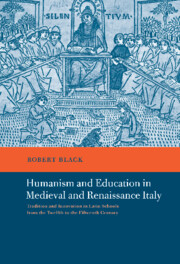 Humanism and Education in Medieval and Renaissance Italy
Humanism and Education in Medieval and Renaissance Italy Book contents
- Frontmatter
- Contents
- Acknowledgements
- List of abbreviations
- Editorial note regarding citations from manuscripts and publications
- A note on chronological terminology
- Introduction
- 1 Italian Renaissance education: an historiographical perspective
- 2 The elementary school curriculum in medieval and Renaissance Italy: traditional methods and developing texts
- 3 The secondary grammar curriculum
- 4 Latin authors in medieval and Renaissance Italian schools: the story of a canon
- 5 Reading Latin authors in medieval and Renaissance Italian schools
- 6 Rhetoric and style in the school grammar syllabus
- Conclusion
- Appendix I BL Harley 2653: the earliest known manuscript of Ianua
- APPENDIX II A handlist of manuscripts of Ianua
- Appendix III Manuscripts of Tebaldo's Regule
- Appendix IV Handlist of manuscripts of school authors produced in Italy and now found in Florentine libraries
- Appendix V Theoretical grammar manuscripts in Florentine libraries examined and included or eliminated as italian school grammars
- Appendix VI Authorities Cited Explicitly in Manuscripts of Major School Authors in Florentine Libraries
- Bibliography
- Index of manuscripts
- General index
Conclusion
Published online by Cambridge University Press: 25 July 2009
- Frontmatter
- Contents
- Acknowledgements
- List of abbreviations
- Editorial note regarding citations from manuscripts and publications
- A note on chronological terminology
- Introduction
- 1 Italian Renaissance education: an historiographical perspective
- 2 The elementary school curriculum in medieval and Renaissance Italy: traditional methods and developing texts
- 3 The secondary grammar curriculum
- 4 Latin authors in medieval and Renaissance Italian schools: the story of a canon
- 5 Reading Latin authors in medieval and Renaissance Italian schools
- 6 Rhetoric and style in the school grammar syllabus
- Conclusion
- Appendix I BL Harley 2653: the earliest known manuscript of Ianua
- APPENDIX II A handlist of manuscripts of Ianua
- Appendix III Manuscripts of Tebaldo's Regule
- Appendix IV Handlist of manuscripts of school authors produced in Italy and now found in Florentine libraries
- Appendix V Theoretical grammar manuscripts in Florentine libraries examined and included or eliminated as italian school grammars
- Appendix VI Authorities Cited Explicitly in Manuscripts of Major School Authors in Florentine Libraries
- Bibliography
- Index of manuscripts
- General index
Summary
The real revolutionaries in the history of Italian medieval and Renaissance school education would appear to be the Northern European grammarians and philosophers who reshaped the theory of language in the twelfth century, together with the thirteenth-century French and Italian teachers who brought this new logical approach to Latin down to the level of the classroom. Like true radicals, masters such as Alexander of Villedieu were extremists, not only opposing the heritage of theoretical grammar as inherited from Roman antiquity but also the reliance on direct study of the Latin classics that had dominated schools since the close of the Dark Ages. Inevitably, there was counterrevolution, though this was not so much the achievement of famous fifteenth-century humanist pedagogues as of their less celebrated predecessors, the grammarians of the Trecento.
The educational momentum inherited by the fifteenth-century Renaissance from the later middle ages was considerable. The system of teaching elementary reading through phonetics as applied to a written text, followed by memorization, had evolved over many centuries; the streamlining of this technique which occurred in the thirteenth and fourteenth centuries made possible an explosion of literacy among the Italian urban population. The extensive penetration of the vernacular into Latin education, not as a system for learning to read, but rather as a tool to simplify the understanding of Latin texts and to ease the learning of Latin composition, facilitated the burgeoning of the Latin-educated professional classes which is such a promiment feature of Italian civic life from the thirteenth to the fifteenth centuries.
These achievements of the later middle ages left humanists of Italian civic life from the thirteenth to the fifteenth centuries.
- Type
- Chapter
- Information
- Humanism and Education in Medieval and Renaissance ItalyTradition and Innovation in Latin Schools from the Twelfth to the Fifteenth Century, pp. 366 - 368Publisher: Cambridge University PressPrint publication year: 2001
